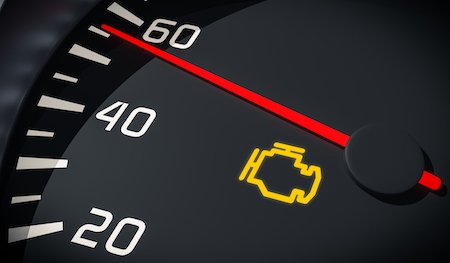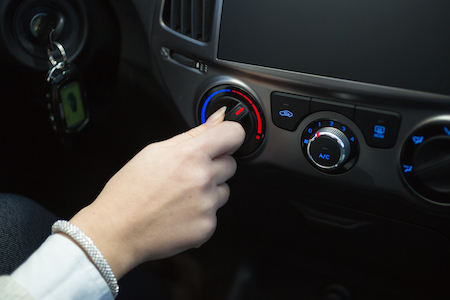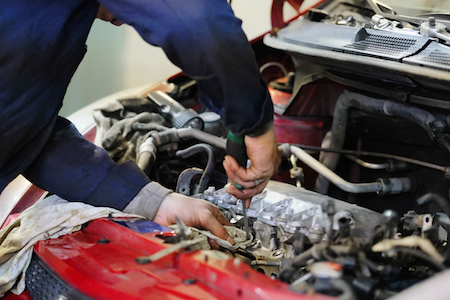We’ve all experienced it from time to time. You’re driving along, and the check engine turns on. What should you do? Do you keep driving? Or should you pull over immediately?
It depends on what your car is doing.
Step one – Diagnose the situation
You know your car best. What has your car been doing up until this point?
Have you heard funny noises? Has your car been operating differently the past few days? Have you smelled strange odors? Have you been having other issues with your driving experience? Your car rarely has an immediate effect without leaving a telltale sign.
If the check engine light turns on and is steady, not flashing, you can keep driving as long as your vehicle isn’t performing out of the ordinary. A steady light is your car’s way of telling you your car is in need of service. (We’ll get into that more in a minute.)
If the check engine light flashes, it’s a more pressing matter. The check engine light is usually yellow or sometimes a red engine-shaped icon located somewhere on your dashboard. All lights might blink on when you first start the car. This is a more serious situation when it blinks and continues to flash after your vehicle is on.
Step two – Heed the warning signs
The check engine light is usually a small icon in the middle of your dashboard, yellow or red in color. All lights may turn on for a few seconds as you start the car. This is your vehicle’s way of testing the system and sending energy to all parts of the car. This is normal.
What isn’t normal is if your check engine continually illuminates as you drive your car. Does the warning light blink for over 6 seconds? Does it continue to blink as you move down the road? This may be an emergency situation. Your car is telling you there is a serious problem with the engine.
Slow down. Pull over as soon as possible. Stop the car and turn off the engine. Otherwise, you risk damaging various parts of your car. Driving with the engine light on at this point will continue to wreak havoc with your car.
Today’s vehicles have all sorts of computerized sensors. It’s designed to take the guesswork out of car maintenance. Instead of having to watch and listen for the signs, your car has a built in system designed to provide you with a warning system to alert you to potential dangers. At the first sign of trouble, it alerts you with a warning light.
The first stage is a steady light. This indicates there is a minor problem somewhere in the system. This gives you a chance to get to where you’re going, schedule a maintenance visit, and fix the problem before it grows.
The second stage is a flashing light. This is an indication there is a severe fault somewhere in the system. It’s your vehicle’s way of telling you something is wrong. Pull over, stop the car, and get service immediately.
While this little blinking light is your car’s way of talking to you, there’s actually more going on behind the scenes. When you bring your vehicle in for service, the engine control unit also stores a fault code related to the malfunction. This can be read and interpreted by your mechanic using a diagnostic tool. After reading the fault codes and diagnosing the full complexity of the situation, a mechanic will then recommend the necessary repairs.
Keep in mind, that the check engine can come on for anything that might be wrong with the system. It might be a small problem or a very large repair. Until its diagnosed, you simply don’t know.
What are the most common causes for the check engine light to come on?
A faulty oxygen sensor – this sensor is designed to monitor the unburned oxygen within the car’s fuel system. It then communicates with the car’s computer to adjust the mixture of air and fuel to ensure your car is getting what it needs to run properly. If the sensor is faulty, your car will burn more fuel, and won’t run as efficiently, releasing more emissions into the air.
A faulty gas cap – when the gas cap is firmly in place on your car, it creates a vapor lock to keep the gas inside the system. If it’s loose, cracked, or faulty, it can cause a leak. Some leaks are more serious than others; a vapor leak might be easily fixed by creating a tighter seal, whereas a crack could be releasing gas into the upper portion of the fuel system, damaging equipment.
A faulty catalytic converter – the catalytic converter controls emissions in your vehicle’s exhaust system. It converts carbon monoxide and other potentially harmful gases into byproducts that aren’t as harmful. If a catalytic converter is faulty, your car can’t perform at optimal levels, and the performance of your vehicle will be impacted.
A faulty mass airflow sensor – the mass airflow sensor, also known as the MAF sensor, helps your car determine how much fuel to be added to the system based on how much air supply is getting to the motor. The most common reason for this sensor failure is due to a dirty air filter, or one that hasn’t been installed correctly. A failure will mean a decrease in fuel economy and poorer performance for your car.
A faulty spark plug – when was the last time you replaced your spark plugs? It’s important to do so according to your car’s manufacturers’ guidelines. The spark plugs and wires work together to ignite the air/fuel mixture and transfer the spark to the ignition coils and plugs. If the spark doesn’t work properly, it reduces fuel efficiency and engine performance.
Can you safely drive with the check engine light on?
Don’t let this little light make you panic. It isn’t always telling you a dire emergency is in place.
If you pay attention to your car, you will understand more about what it’s trying to tell you. You’ll know what to do in every situation.
- A check engine light that is flashing is telling you to stop the car as soon as you reach safety. Call in a tow and bring it into one of our mechanics to diagnose the problem.
- A check engine light that is solid is a gentle reminder to bring your car in at your earliest convenience. It’s your car’s way of saying it needs a little maintenance.
Schedule your appointment today.


 Question: My headlight lenses are all cloudy. I checked with my vehicle dealership about replacing then and it is very expensive. What else can I do?
Question: My headlight lenses are all cloudy. I checked with my vehicle dealership about replacing then and it is very expensive. What else can I do?



 A lot of people have older vehicles. They’re good commuters, grocery store runners, or toy-haulers. Their owners enjoy the fact that they’re paid off, or will be soon. They would gladly like to make their vehicles last for 200,000 miles or more…as long as it’s economical for them to do so.
A lot of people have older vehicles. They’re good commuters, grocery store runners, or toy-haulers. Their owners enjoy the fact that they’re paid off, or will be soon. They would gladly like to make their vehicles last for 200,000 miles or more…as long as it’s economical for them to do so.
 A car sitting in a garage, barely used, sounds like the perfect way to preserve a vehicle. If it doesn’t hit the streets regularly, nothing wears out … right?
A car sitting in a garage, barely used, sounds like the perfect way to preserve a vehicle. If it doesn’t hit the streets regularly, nothing wears out … right?